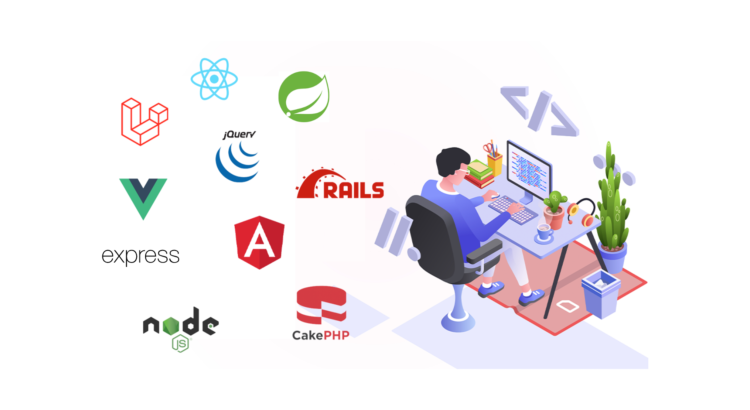When it comes to web app development, the backend is the backbone that powers the entire operation. It handles data storage, processing, and server-client communication. To streamline the development process and ensure scalability, developers rely on robust backend frameworks. Following are some essential frameworks for web app development backend.
- Node.js :- Node.js is renowned for its speed and scalability. It’s built on Chrome’s V8 JavaScript engine and utilizes an event-driven, non-blocking I/O model, making it ideal for building real-time applications. With a vast ecosystem of packages available through npm, Node.js empowers developers to create efficient and high-performance web applications.
- Ruby on Rails :- Known simply as Rails, this framework follows the convention over configuration (CoC) and don’t repeat yourself (DRY) principles. It emphasizes simplicity and encourages rapid development. Rails is an excellent choice for start-ups and small teams due to its robust set of built-in tools and a thriving community.
- Django :- Django, a Python-based framework, is favoured for its simplicity and versatility. It provides a high-level, Pythonic experience for developers. Django’s batteries-included approach means it comes with numerous built-in features, including an ORM (Object-Relational Mapping) system, authentication, and an admin panel. It’s perfect for projects where security and rapid development are paramount.
- Express.js :- Express.js is a minimalist Node.js web application framework, ideal for building APIs and single-page applications. It provides a straightforward and unopinionated approach, allowing developers to select their tools for databases, templates, and more. Its simplicity makes it a top choice for building RESTful APIs.
- ASP.NET Core :- Microsoft’s ASP.NET Core is a versatile and open-source framework for building modern, cloud-based, and internet-connected applications. It’s cross-platform, supporting Windows, Linux, and macOS. With features like built-in dependency injection and a robust middleware system, ASP.NET Core simplifies complex web app development.
- Laravel :- Laravel, a PHP framework, is known for its elegant syntax and a wide range of built-in features like authentication, routing, and caching. It encourages the use of modern PHP features and tools. Laravel’s Blade templating engine simplifies front-end development while maintaining a clean backend codebase.
- Spring Boot :- Java developers often turn to Spring Boot for its ease of use and rapid development capabilities. It offers a comprehensive ecosystem, including libraries for data access, security, and messaging. Spring Boot’s focus on convention over configuration ensures developers can get started quickly.
- Phoenix (Elixir) :- Phoenix is a real-time web framework built with Elixir, a functional programming language. It boasts impressive speed and scalability, making it perfect for building applications that require high concurrency. Its channel system enables real-time communication.
In conclusion, the choice of a backend framework depends on factors like project requirements, team expertise, and scalability needs. These frameworks have earned their reputation for simplifying web app development and providing the tools necessary to create powerful, efficient, and secure applications. Regardless of your choice, understanding the strengths and weaknesses of each framework is crucial to delivering exceptional web apps.
